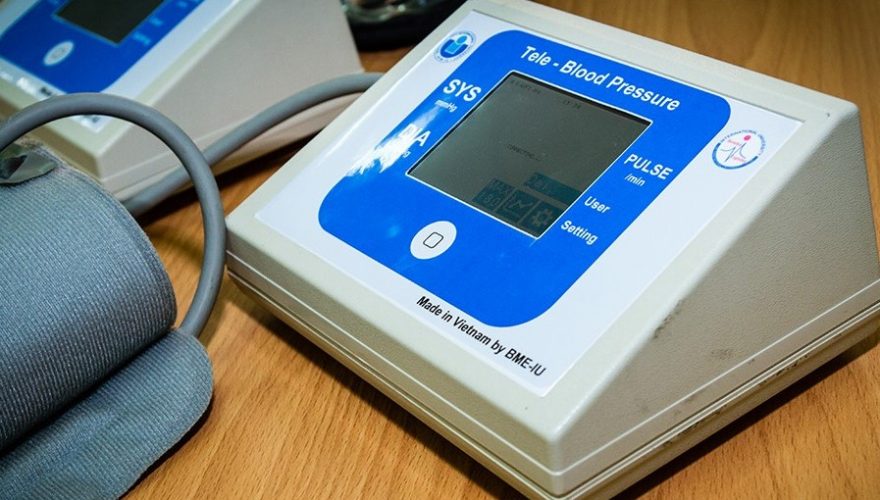PhD of Biomedical Engineering
Course Description
OVERVIEW
Biomedical Engineering or Bioengineering is a multi-disciplinary course that applies advanced technology to promote new research methods and invent medical devices (X-ray machine, CT scan, cardiac pacemaker) for healthcare treatment and deeper understandings of human biological processes. This is a prominent field that is growing strongly in many countries around the world and offers a lot of career opportunities in scientific research as well as industry. It is suitable for candidates interested in design, manufacturing and scientific research who have foundation engineering, applied sciences, medicine, pharmacy, dentistry, psychology, management, and business.
International University is the only education unit that has PhD of Biomedical Engineering taught in English. Department of Biomedical Engineering was established in 2009 that became School of Biomedical Engineering in 2019 with specialization in medical devices. This research interest meets the urgent needs of the country and enhances scientific and technological development for integration to international scientific community. Therefore, the School collaborates with entrepreneurship and hospitals to bring out high-quality, sustainable, and practical innovations.
1. General Information
- Program Code: 9520212
- Education Level: PhD
- Form of Education: Formal (full-time)
- Location: Thu Duc Campus
- Teaching Language: English
- Duration: 3 – 4 years
- Training Method: Research-based
- Training Unit: School of Biomedical Engineering, International University, VNU-HCM
2. Training Objectives
2.1. Knowledge:
- Advanced knowledge in biomedical engineering, including medical instrumentation, biomedical electronics, biotechnology, and related fields.
- In-depth understanding of research methodologies and scientific approaches in biomedical engineering.
2.2. Skills:
- Ability to conduct independent and original research in biomedical engineering.
- Proficiency in designing, developing, and testing medical devices and technologies.
- Capability to collaborate with industry partners and healthcare institutions to translate research into practical applications.
- Effective communication and presentation skills for scientific findings.
3. Career Orientation
After graduation, students can pursue careers as:
- Lecturers or researchers in Biomedical Engineering or related fields in universities and colleges.
- Researchers in medical universities specializing in areas such as Medical Instrumentation, Pharmaceutical Engineering, Biomaterials, Medical Engineering, Diagnostic Imaging, and Functional Medicine.
- Heads of medical equipment management or clinical chief engineers in domestic and international hospitals.
- Post-doctoral researchers or academic professionals in the field of biomedical engineering.
4. Reference academic program
The PhD program in Biomedical Engineering involves advanced coursework and a significant research component leading to a dissertation. For detailed information about the academic program, click here.
5. About the School
School of Biomedical Engineering used to have 8 doctoral lecturers who graduated from prestigious abroad universities, in which Professor Vo Van Toi was a former Head of Department of Biomedical Engineering, Doctor of Micro-Engineering from Ecole Polytechnique Fédérale de Lausanne, EPFL, Switzerland. He once undertook a post-doctoral program in the Health Science and Technology, HST which was held by Harvard University and Massachusetts Institute of Technology (MIT). Between 1984 and 2009, he became a professor in Tufts University, USA as well as a co-chairman in many joint programs between School of Engineering and School of Medicine/School of Dental Medicine of the university. Moreover, he was a visiting professor at Scheie Eye Institute of the Presbyterian Medical Center of the University of Pennsylvania Health Care System; a co-founder of Vietnam North American Professors Network (VNAUP) in order to connect Vietnamese professors in the North America. In 2003, he established Department of Biomedical Engineering of Tufts University. From 2004 to 2007, he was appointed by the US President G. Bush as a Member of Board of Directors of the Vietnam Education Foundation (VEF). It is an independent U.S. Federal Government Agency founded in 2003 to provide abroad opportunities for Vietnamese candidates who eager to undertake Master or PhD program in prestigious US universities in STEM, as well as bringing American professors to teach in Vietnamese universities. From 2007 to 2009, Professor Vo Van Toi was appointed as the Executive Director of VEF before his resignation to establish Department of Biomedical Engineering at International University, Vietnam National University Ho Chi Minh City.
Course Info
- Duration: 3 - 4 years
- Language: English
- Location: Thu Duc Campus
- Prerequisites: No
- Course Capacity: 50
- Certificate: No
About Instructor
-

Thanh Sơn






